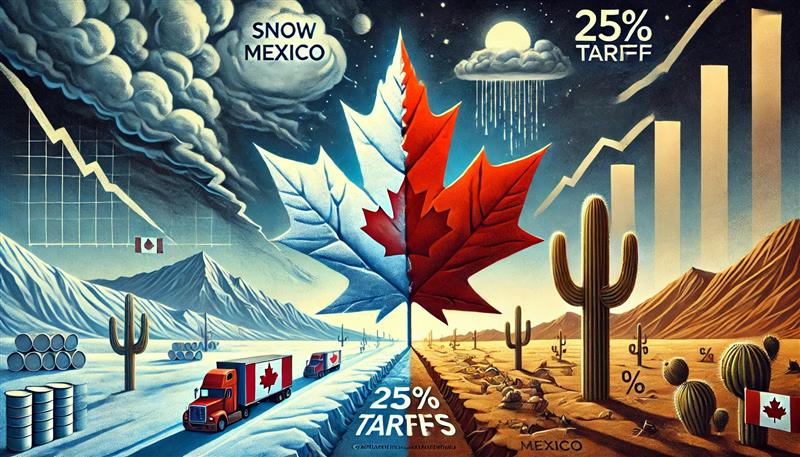Donald Trump’s tariffs have sparked alarm across Canada with some experts warning they could cripple the nation’s economy, potentially reducing it to what some describe as the economic status of a third-world country. This dire prediction has led to the tongue-in-cheek moniker “Snow Mexico.” But how serious is this threat, and what exactly are tariffs?
What Are Tariffs?
A tariff is a tax on imports or exports. In this case, the U.S. government will impose a 25% tax on any product imported from Canada. Although Canadians won’t pay this tax directly, it will make Canadian goods significantly more expensive in the U.S. market. As a result, American companies and consumers are likely to seek cheaper alternatives, whether domestically produced or sourced from other countries.
Given that the U.S. is Canada’s largest trading partner, these tariffs pose a critical challenge to the Canadian economy.
Canadian explains Trumps tariffs. 👇🏽 pic.twitter.com/5GS1YsmTHz
— John Cerrone (@jc_limitless) February 2, 2025
Canada’s Economy and U.S. Trade Dependence
To understand the gravity of the situation, consider that about 60% of Canada’s international trade is with the U.S., representing roughly 40% of the country’s GDP. This trade accounts for nearly half of Canada’s overall economic output. If tariffs undermine this trade relationship, Canada’s economy could face catastrophic consequences.
Ontario Premier Doug Ford has been warned that these tariffs could lead to a surge in unemployment, with 500,000 to 600,000 jobs at risk. Ontario’s current unemployment is around 600,000, meaning these losses could double unemployment rates in the province, potentially pushing them into double-digit figures.
Related:
Why Are Tariffs Being Imposed?
According to Trump, Canada’s border security is a major factor driving these tariffs. The number of individuals on terrorist watch lists apprehended at the Canada-U.S. border has increased dramatically. Over 350 such individuals have been detained at the northern border, compared to about 150 at the Mexico-U.S. border. This disparity suggests that lax immigration policies have made Canada a preferred route for criminal organizations and terrorists seeking entry into the U.S.
Mexico and China have been taking advantage of the United States for decades.
Finally, we have a president in Donald Trump who is ready to look out for American citizens and impose some consequences to show these countries that we’re not going to be taken advantage of. pic.twitter.com/92XwRJhspD
— JD Vance (@JDVance) February 2, 2025
Immigration Policies Under Scrutiny
Under Prime Minister Justin Trudeau, Canada’s “open-border” approach has faced significant criticism. Reports highlight systemic abuses in the country’s immigration and asylum programs. For example, The Globe and Mail recently reported that 50,000 international students failed to attend classes, raising concerns that many use student visas to enter Canada and then vanish. India has launched an investigation into its citizens exploiting this program to cross illegally into the U.S.
Canada’s asylum policies have also come under fire. One striking example involves Ahmed Al Didi, who was granted Canadian citizenship despite being filmed committing atrocities for ISIS. While such cases are rare, they underscore vulnerabilities in the system that undermine border security.
Economic Consequences of the Tariffs
Every Canadian province and territory conducts more trade with the U.S. than with other Canadian provinces. This heavy reliance on U.S. trade means that tariffs will reverberate throughout the entire country, not just in specific regions.
Canada’s government, meanwhile, appears unprepared to confront the crisis. Parliament has been prorogued to prevent a no-confidence vote, and there is speculation that Mark Carney, another leader affiliated with the World Economic Forum, may soon replace Trudeau. Critics argue that this leadership shuffle will do little to change the policies—such as open borders—that triggered the tariffs in the first place.
Ontario Premier Doug Ford has suggested retaliatory measures, but Canada’s weakened economy limits its ability to negotiate effectively. Economic growth has stagnated, and unsustainable immigration has become a poor substitute for genuine economic development.
Is There a Path Forward?
One potential silver lining is that Trump may be using these tariffs as a negotiation tactic. By applying economic pressure, he could be seeking to force changes in Canadian leadership and policy. However, with a government seemingly more interested in retaining power than addressing economic vulnerabilities, the path forward remains uncertain.
A Precarious Future
The imposition of these tariffs threatens to shake Canada to its core. Without decisive action to strengthen the economy and address security concerns, the nation risks long-term economic decline. Leaders and citizens alike must prepare for significant challenges ahead.
The question remains: will Canada adapt and rise to the occasion, or will it be overwhelmed by the weight of these unprecedented tariffs?
Biblical Reasoning: God Assigns Borders
The concept of nations and borders has a biblical foundation. Acts 17:26 states, “From one man He made all the nations, that they should inhabit the whole earth; and He marked out their appointed times in history and the boundaries of their lands.” This passage reveals that God has sovereignly established the boundaries of nations for His purposes. Borders play a crucial role in maintaining order, preserving cultural identity, and fostering accountability among nations. Policies that regulate borders align with the biblical principle of stewardship, requiring leaders to protect both the welfare of their citizens and the integrity of their nation. Therefore, debates on tariffs and border security often carry spiritual significance, reflecting God’s design for structured governance and national sovereignty.
Thank you John Cerrone for helping us better understand what is taking place with the tariff’s on Canada and why.
I just had a good call with President Trump. Canada is implementing our $1.3 billion border plan — reinforcing the border with new choppers, technology and personnel, enhanced coordination with our American partners, and increased resources to stop the flow of fentanyl. Nearly…
— Justin Trudeau (@JustinTrudeau) February 3, 2025





